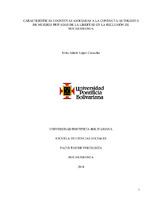Características cognitivas asociadas a la conducta autolesiva de mujeres privadas de la libertad en la reclusión de Bucaramanga

View/
Date
2018Author
López Camacho, Erika Julieth
xmlui.dri2xhtml.METS-1.0.item-advisor
Director. Larrotta Castillo, Richard
xmlui.dri2xhtml.METS-1.0.item-type
Trabajo de grado
Citación
Metadata
Show full item recordDocuments PDF
Abstract
El presente estudio tuvo como objetivo describir las características cognitivas asociadas a la conducta autolesiva de mujeres privadas de la libertad recluidas en el establecimiento penitenciario de alta y mediana seguridad de Bucaramanga — Colombia, desde un enfoque cognitivo-conductual. Metodología: El presente trabajo es un estudio descriptivo multidimensional en el que se cuantifican y relacionan textos (Peña, 2000). Basado en un método: a) descriptivo unidimensional a través del cual se resume y cuantifica la frecuencia relativa a partir de las palabras; y b) descriptivo multidimensional, en el cual la información es procesada a través de la herramienta estadística SPAD 9.0, que permite investigar cuantitativamente la estructura de asociación de palabras (Lebart, Salem y Bécue, 2000), para ello se diseñó el instrumento "Percepción Motivacional de las Autolesiones" que consta de 46 items de los cuales 2 son de selección múltiple, 6 de respuesta dicotómica y 38 preguntas abiertas, además un cuestionario breve de datos para la caracterización de la población. La muestra estuvo conformada por 27 mujeres en edades entre 19 y 34 años de edad; con una media de 27 años. Los resultados permiten deducir que las características cognitivas destacadas en el corpus textual se asocian con sentimientos de desesperanza, expresiones de soledad, desagrado por la vida, estados depresivos, conductas autoliticas, conductas violentas y pensamientos negativos. Como conclusión principal se destaca la importancia de acontecimientos del ciclo vital, situaciones, emociones, y conductas asociadas con aspectos cognitivos presentes en la realización de conductas autolesivas. The objective of this study was to describe the cognitive characteristics associated with the self - injurious behavior of women deprived of liberty confined in the high and medium security prison of Bucaramanga - Colombia, from the cognitive - behavioral approach. Methodology: The present work is a multidimensional descriptive study in which texts are quantified and related (Pena, 2000). Based on a method: a) descriptive one-dimensional through which the relative frequency is summarized and quantified from the words; and b) descriptive multidimensional, in which the information is processed through the statistical tool SPAD 9.0, which allows to quantitatively investigate the structure of word association (Lebart, Salem and Becue, 2000), for which the instrument Motivational Perception\" was designed of the Self-injuries \"that consists of 46 items of which 2 are multiple selection, 6 of dichotomous response and 38 open questions, plus a brief questionnaire of data for the characterization of the population. The sample consisted of 27 women in ages between 19 and 34 years of age; with an average of 27 years. The results allow to deduce that the cognitive characteristics highlighted in the textual corpus are associated with feelings of hopelessness, expressions of loneliness, dislike of life, depressive states, self-limiting behaviors, violent behaviors and negative thoughts. The main conclusion highlights the importance of life cycle events, situations, emotions, and behaviors associated with cognitive aspects present in the performance of self-injurious behaviors.
Keyword/s
Presos
Mujeres
Carácter y características
Depresión mental
Conducta suicida
Collections
- Trabajos de grado [6698]
The following license files are associated with this item:

